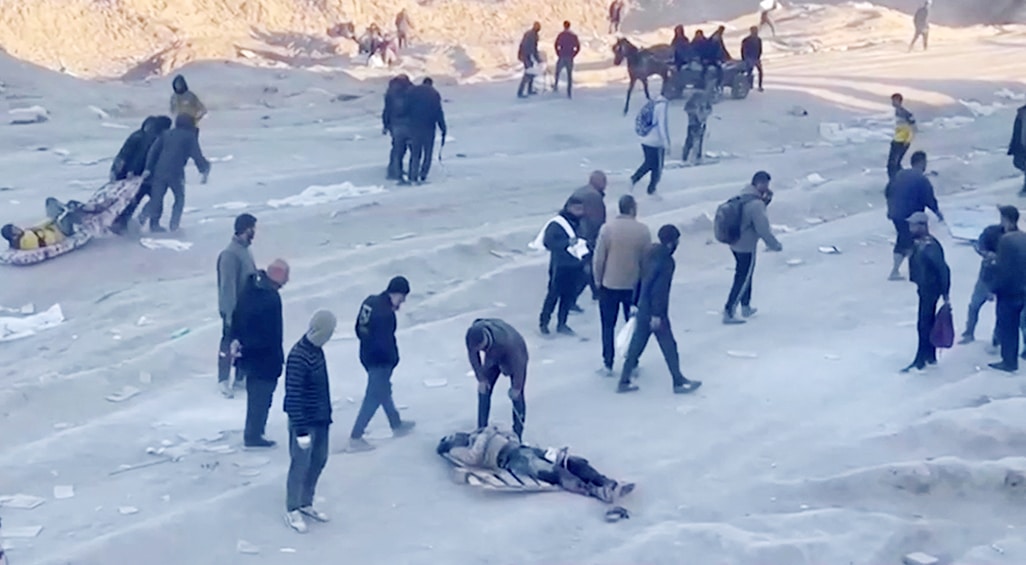France and Germany joined calls on Friday for an independent inquiry into the deaths of dozens of Palestinians awaiting aid in Gaza, an incident which Israeli media said could weaken Israel‘s international position after troops fired at the crowd.
Gaza health authorities said Israeli forces had killed more than 100 Palestinians trying to reach a relief convoy near Gaza City early on Thursday.
Israel blamed most of the deaths on crowds that swarmed around aid trucks, saying victims had been trampled or run over. An Israeli official also said troops had “in a limited response” later fired on crowds they felt had posed a threat.
The incident has underscored the depth of the humanitarian crisis and collapse of orderly aid deliveries in areas of northern Gaza occupied by Israeli forces as part of their response to the deadly attack on Israel by the Palestinian militant group Hamas on Oct. 7.
French President Emmanuel Macron voiced “deep indignation” and the “strongest condemnation of these shootings”. His foreign minister, Stephane Sejourne, said Paris would back an independent investigation sought by U.N. Secretary General Antonio Guterres.
German Foreign Minister Annalena Baerbock said “the Israeli army must fully explain how the mass panic and shooting could have happened.”
Israel‘s closest ally, the United States, has also urged a thorough investigation, saying the incident shows the need for “expanded humanitarian aid to make its way into Gaza”.
In Israel, an opinion piece on the N12 online news site said the incident underscored the lack of any civil administration or rule of law in Gaza, and that this “may place Israel in a difficult position in terms of legitimacy for continuing the fighting”.
A columnist in the biggest daily newspaper Yedioth Ahronoth said that whatever happened at the aid delivery, the image the world would retain would be of hundreds of “starving and desperate” people including women and children pouncing on food and being shot by Israeli soldiers.
“Some think this incident will create a turning point in the war… will exert international pressure that Israel will not be able to withstand, including from the White House,” it said.
The war began on Oct. 7 when Hamas fighters stormed from Gaza into Israel, killing 1,200 people and seizing 253 hostages, according to Israeli tallies.
Israel‘s military campaign has since killed more than 30,000 Palestinians in Gaza, health authorities in the Hamas-run enclave say.
AID DELIVERY ROW
A humanitarian disaster is unfolding in the Gaza Strip, particularly the north, after nearly five months of an Israeli air and ground campaign that has ruined swathes of the crowded coastal enclave and pushed it to the edge of famine.
With people eating animal feed and even cactuses to survive, and with medics saying children have started to die in hospitals from malnutrition and dehydration, the U.N. has said it faces “overwhelming obstacles” getting in aid.
The U.N. humanitarian agency OCHA said obstacles included “crossing closures, restrictions on movement and communications, onerous vetting procedures, unrest, damaged roads and unexploded ordnance.”
Last week the U.N. said aid flows into Gaza were drying up and it was becoming increasingly hard to distribute aid within the enclave because of a collapse in security, with most residents hemmed into makeshift camps.
Israel has said there is no limit on humanitarian aid in Gaza and has said the quantity and pace of delivery was down to the U.N.
Israel‘s military said Thursday’s delivery was operated by private contractors as part of an aid operation it had been overseeing for the previous four days.
OCHA spokesperson Jens Laerke said the delivery was made without any coordination with the U.N.
The war has driven out the Hamas-run government that previously administered Gaza and rendered municipal police helpless, while the work of the main U.N. agency operating in the enclave has been constrained by Israeli accusations it was complicit in the Oct. 7 attack, which it denies.
“This tragic massacre, as some are calling it, is an illustration of why UNRWA needs to be distributing aid in Gaza to stave off mass starvation, which has already begun,” said Chris Gunness, a former UNRWA spokesperson.
“It’s an illustration that you cannot leave the protection of the Palestinians in Gaza in terms of food security to the Israelis,” he added.







Click here to change your cookie preferences